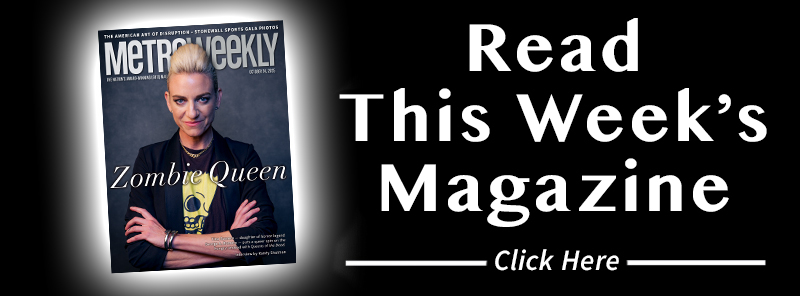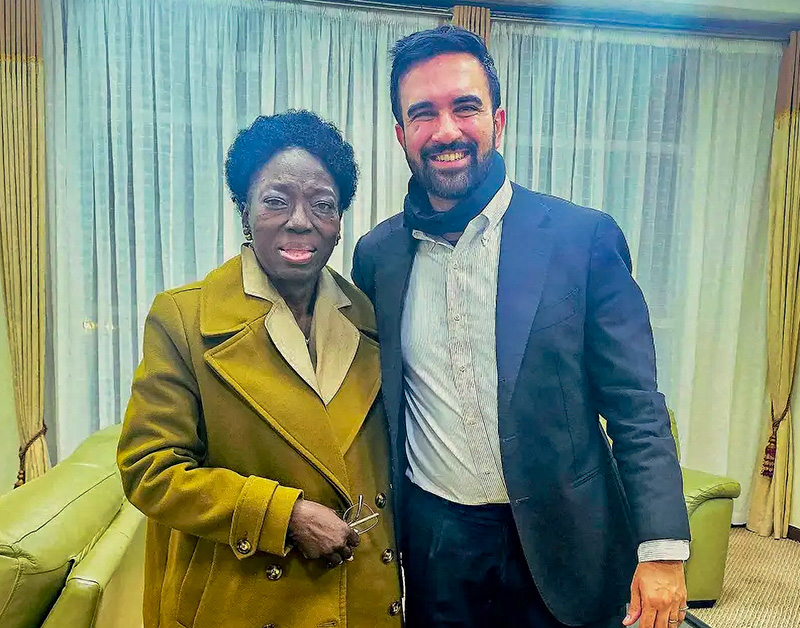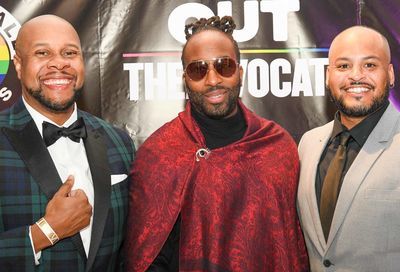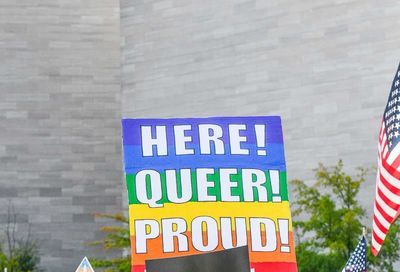Roll Over
Ford puts itself at the center of the latest battle over gays and corporate America
News broke slowly last week about the American Family Association’s announcement that it would call off its planned boycott of Ford Motor Company. Donald E. Wildmon, chairman of the notoriously anti-gay AFA, said that calling off the boycott was the result of talks among AFA, Ford dealerships and Ford corporate representatives.

”While we still have a few differences with Ford, we feel that our concerns are being addressed in good faith and will continue to be addressed in the future,” he was quoted in the release.
It was a surprising bit of news, first reported by WardsAuto.com, an outlet that primarily serves auto dealerships and the automotive industry. And while it may have broken slowly, the story quickly gathered steam, rallying GLBT organizations and working its way into headlines and news broadcasts across the nation.
Neither Ford nor the AFA would provide details about what agreement, exactly, led to the decision to avoid the boycott, and Ford has repeatedly asserted in news stories that no agreement or deal was made with AFA to end the boycott.
Ford spokesman Mike Moran said that the automotive giant — one of the ”Big Three” American automakers, along with General Motors and Daimler-Chrysler — was ”pleased that the AFA has decided to end its boycott.”
”Some months ago we began a constructive dialogue with them, just as we do with other customers and interest groups,” Moran said. ”While we don’t agree on all issues, we expect the dialogue to continue so that we understand each other better.”
Asked about the initial report that Ford would be curtailing advertising with the gay press, Moran told Metro Weekly on Dec. 1 that Land Rover and Jaguar would not be advertising in gay publications in 2006, while Volvo would continue its advertising in such venues as Advocate, Genre and Out because the brand believes ”it’s an effective way to market their vehicles.”
When asked if the advertising was being discontinued because of the threatened AFA boycott, Moran said, ”Ceasing advertising is an outgrowth of those meetings.”
However, in later statements to other media outlets, Moran and other spokespersons have maintained that there is no agreement between AFA and Ford to end advertising in the gay and lesbian press, or to end support for gay and lesbian organizations, as part of a deal to end the boycott threat. Instead, in statements to the Associated Press and other outlets, Moran and others maintain that the decision was made for business reasons. Like other domestic automakers, Ford currently faces dispiriting sales numbers that, they say, require revisiting their marketing and advertising budgets.
Moran did not return calls seeking clarification of his statement by Metro Weekly press time. AFA did not respond to repeated requests by Metro Weekly for comment.
However, a new report on Tuesday, Dec. 6, from WardsAuto.com claims that Ford agreed to end advertising for Land Rover and Jaguar, and use ”generic” advertisements for Volvo’s gay press buys. Ford also reportedly agreed to end its support of ”gay and lesbian events.”
|
In a letter to Ford GLOBE — a group representing the corporation’s GLBT employees — Ford said, ”Our latest discussions with the AFA cleared up a lot of misunderstanding about Ford’s policies and practices. The AFA mentioned in its announcement that differences with Ford remain, which is true. But in our view the boycott ended because AFA leadership now has a better understanding of the principles that drive our company’s policies as well as our wish to avoid politically and socially charged debates, which can only distract from our primary purpose — to design, manufacture and sell the best vehicles we can.”
Others in the gay community believe that there is certainly a confidential deal between Ford and AFA, a belief reinforced by the unwillingness of both sides to discuss details of their meeting. Many have expressed frustration with Ford, saying that what information the company provides about the current situation varies depending on which source one talks to.
Due to these and other conflicting statements by Ford representatives, there was much confusion among GLBT political organizations about what strategy, if any, Ford was pursuing. How could a company with a 100 percent rating on gay and lesbian issues from the Human Rights Campaign, a company known for providing strong benefits for its gay and lesbian workforce, and a company with brands that have aggressively pursued a gay and lesbian market suddenly descend into public relations chaos and a reportedly secret deal with an organization that strives to turn back the progress of the GLBT community?
IN ITS ORIGINAL announcement in May of this year, the AFA said it would launch a boycott of Ford if certain conditions were not met, including the end of advertising targeting the gay community and discontinuing support for ”gay marriage.” AFA also, according to its Web site, is unhappy with Ford’s continuing pro-gay policies for its employees.
Some of the advertising referenced by the AFA was developed for European gay markets, although a number of advertisements have appeared in the U.S. market. Also mentioned on the ”Boycott Ford” Web site was Witeck-Combs, a D.C.-based marketing firm that specializes in helping corporations reach a gay and lesbian market.
As of Metro Weekly press time, www.boycottford.com had been redirected to the AFA home page.
AFA has been involved in numerous boycotts, both current and past — ”Their boycott list reads like the New York City phone book,” quipped an HRC staffer — including a seasonal boycott of Target department store for its use of the word ”holiday” instead of ”Christmas.”
AFA has been particularly active threatening boycotts over gay issues. Earlier this year, AFA ended its long-standing boycott of Disney, even though the entertainment behemoth never met any of the group’s demands, and suffered no apparent economic effect.
Other corporations that have faced AFA boycott threats include Nike, Kraft, Walgreens and Proctor & Gamble. According to HRC, none of those corporations have conceded to AFA’s demands.
In October, HRC president Joe Solmonese requested a meeting with Ford about AFA’s boycott threat.
”As we know through our work with other companies that have been the target of ill-conceived campaigns from the AFA, Ford is at a critical juncture in positioning itself and its products,” Solmonese wrote. ”The AFA has a history of distorting conversations and mischaracterizing corporate policies in the media. Sometimes, those perceptions can become dangerous realities with serious consequences for the company’s reputation.”
Those sentences may have proven prophetic, as community reaction to the news of Ford’s possible capitulation spurred organizations and individuals into action.
 Foreman Photo by Todd Franson |
Task Force executive director Matt Foreman was one of the primary organizers, along with HRC and the Gay and Lesbian Alliance Against Defamation (GLAAD), who pulled together a coalition of 18 national GLBT organizations to craft a joint statement, released late Monday, Dec. 5. (See page 33 for a full list of joint statement participants.)
”We are deeply dismayed by reports in the media and otherwise that the Ford Motor Company has entered into a confidential agreement with the extremist American Family Association that requires Ford to stop advertising in lesbian, gay, bisexual and transgender (LGBT) media,” the statement reads. ”If there is an agreement with AFA, we expect Ford to disavow it. We expect Ford to publicly reaffirm its historic support for our community. And, we expect Ford to meet with LGBT representatives this week to resolve these concerns.”
Foreman said that he was ”dismayed” by the reported deal with the AFA, and expressed his frustration that so much information out there was unclear as to what exactly transpired, in large part because Ford has put out conflicting stories.
”It is abundantly clear that there has been a massive breakdown in communications within Ford,” he told Metro Weekly. ”It’s a textbook example of how to handle a situation miserably.”
Daryl Herrschaft, director of the HRC Workplace Project, said that although his organization had been happy with Ford’s initial response to the boycott, the reports of the meeting with AFA were worrisome based on past experience.
”Savvy companies would be very cautious about these kinds of meetings,” Herrschaft said. ”We’ve seen companies walk into meetings with right-wing extremist groups and just not know what they’re getting into.”
However, Herrschaft said this particular meeting — which reportedly took place at AFA’s Tupelo, Miss., headquarters and included Ford Motor Company representatives as well as some individual Ford dealers — was different because it seemed to result in a formal agreement between Ford and AFA.
Both Herrschaft and Foreman said they expect a meeting between their organizations and Ford this Friday, Dec. 9.
”We are extremely interested to find out what is in that agreement,” he said. ”Unfortunately, what has befallen the company is that the left hand doesn’t know what the right hand is doing.”
Herrschaft noted that simply having a meeting with AFA was not, in and of itself, a problem. ”Everyone buys Ford products. It’s not an issue of sitting down and talking to someone.”
It’s also not simply an issue of keeping advertising for some gay markets.
”We’re not talking about giving up someone’s salary so you can place an ad in a gay magazine,” said Herrschaft. ”We’re talking about secret arrangements with people who seek to demonize our community. And for a company that respects diversity as much as Ford does, that’s an unacceptable position.”
DESPITE CONFLICTING ACCOUNTS of the reasoning behind the decision, Ford has been consistent since the AFA announcement in saying that Land Rover and Jaguar advertising would cease in 2006. But, further adding to the confusion, neither those individual brands nor the press outlets affected seemed to have been notified of the decision.”The advertising contacts that we’ve been in touch with to try and ascertain [the situation], we were the first people to inform them there might be trouble,” Out and Advocate publisher Joe Landry told Metro Weekly on Dec. 2.
Landry said this is the first time in his career that he’s seen this type of action on the part of a corporation. While declining to provide a monetary sum, Landry said Jaguar and Land Rover combined in 2005 had bought 17 ad pages in Out and 19 pages in Advocate.
The brands have also advertised in the rival gay glossy, Genre.
”It’s a large piece of business, which we’ll be able to make up,” Landry said. ”It more disturbing to me on a personal, social level, that, if it is indeed the case, they would fold [to the AFA] after doing such a terrific job of aligning themselves with the community beyond just advertising.”
Witeck-Combs works with Jaguar, Land Rover and Volvo in their marketing efforts to the gay community. CEO Bob Witeck said that as of Dec. 6, they had received no instructions regarding marketing efforts in light of Ford’s statements that some advertising would be ending.
”The brands themselves…are not completely aware of all the discussions that have taken place,” said Witeck. Absent any instruction to change, they are continuing to move forward with their previously made plans.
Witeck said he was unsurprised that AFA would have included his agency in its list of reasons to boycott Ford.
”I have no doubt that we’re monitored,” he said. ”They want to know what we’re up to, they want to know what we’re advising. [But] we’re very transparent.
”We’re talking about commerce.”
While initial news reports have focused on Ford’s decision to pull Jaguar and Land Rover advertising — and Ford’s continuing efforts to characterize it as a ”business” decision — on late Tuesday, Dec. 6, WardsAuto.com came out with a new report outlining further details of Ford’s alleged agreement with AFA.
According to their sources, in addition to ending Land Rover and Jaguar’s gay press advertising, ”Volvo Cars will continue to advertise in the publications but will use generic ads not tailored to the gay community.
”In addition, Ford has agreed not to sponsor any future gay and lesbian events but will continue to maintain its employee policies, such as same-sex partner benefits,” says the report.
The report goes on to say that a Ford spokesman ”insists the halt in advertising is a ‘business decision,’ rather than part of any agreement with the AFA.”
AFA continues to decline comment.
HRC’s Herrschaft said that if Ford indeed agreed to change Volvo’s advertising to generic ads only, it would likely immediately impact the automaker’s promotion in which gay and lesbian Volvo buyers can have a portion of their purchase price donated to HRC (Land Rover and Jaguar have a similar program benefiting GLAAD). Also, in its submission for HRC’s corporate equality index, Ford listed a number of event sponsorships including eight regional HRC dinners, the Family Pride Coalition’s ”Family Week” in Provincetown, and a number of events with the Gay and Lesbian Alliance Against Defamation.
”The implication is that, if you take it to its logical conclusion, then sponsorship of HRC or GLAAD would be impossible,” Herrschaft said.
FOR JOHN ARAVOSIS, the situation is very reminiscent of the earlier effort this year by religious conservatives in Washington to get Microsoft to end support for that state’s proposed domestic-partner legislation. When word got out that Microsoft had dropped its support under threat of a boycott, Aravosis and his Web site, Americablog.com, spearheaded an aggressive effort to get the historically gay-and-lesbian-friendly company back on track on GLBT issues.
 Aravosis Photo by Todd Franson |
”It’s just like Microsoft, and just like every corporation we ever deal with,” said Aravosis. ”They are more afraid of the religious right than they are of us. We try to talk to them they don’t listen, then everything blows up in their face, and they ask, ‘Why?”’
Aravosis sees AFA’s actions as part of an overall strategy to go after the pillars of the GLBT community’s support.
”They want to knock out the foundation of our movement, in this case the financial and cultural support,” he said. ”They’re going after the ones who embrace us, who support their [gay] employees…. They’re going after our strengths and knocking them down.”
Peter LaBarbera, head of the Illinois Family Institute (IFI) and long-time anti-gay activist, said that the gay community has had a huge amount of success in recruiting corporations to its side.
”I would say the gay side is miles ahead of us,” he said. ”They were smart enough to go at it early, and make their focus not just on politics, which is a clear mistake of my side, which focused more on Washington and not as much on the cultural aspects.”
LaBarbera, who is currently working to have Walgreens and other corporations drop their sponsorship of the 2006 Gay Games in Chicago, said that the corporations don’t realize how their pro-gay activities damage their reputation with ”pro-family perspectives.”
IFI is not affiliated with AFA’s effort to boycott Ford. LaBarbera expressed some reservations about the effectiveness of boycotts, particularly if there are too many going on.
”There’s so much stuff that qualifies for [a] boycott that you have to pick and choose,” he said.
Still, AFA’s threatened boycott may have driven some independent Ford dealers to push the corporation to reach an agreement.
”I would say dealers played a big role in this,” said Cliff Banks, a Ward’s Auto editor and one of the reporters on the WardsAuto.com stories. ”A lot of them are in the Bible-belt area, and they were hearing a lot from their customers, saying that they were going to go along with the boycott.”
Banks said that the feeling among those dealers is that AFA is a powerful group with their customers. But, he said, ”Ford could have handled the situation better.”
”It’s pretty obvious to me that Ford wanted to avoid one boycott, and avoid stepping into another boycott,” he said.
Of the people interviewed for this article, none could think of a recent boycott effort that had definitively moved a corporation away from gay-friendly policies.
”There has been no real successful boycott of a company based on its marketing activities in the gay and lesbian community,” said Howard Buford, founder and CEO of Prime Access, a New York advertising agency specializing in African-American, Hispanic and gay and lesbian marketing. Buford said that corporate America has really led the charge on gay and lesbian marketing, but ”they don’t pursue it as part of a social justice program…. Corporate America does everything based on the business model, and the business model is saying this is the thing to do.”
|
Aravosis, who is running an intense campaign against Ford on his web site, says it’s important for the gay community to act quickly, because a boycott against an ally will only be effective if the community doesn’t fight back.
”What we’ve found is that every time we’ve fought back, we win,” he said. In the earlier Microsoft campaign, the software giant fairly quickly changed its position back to a gay-friendly one.
Kathleen deBold, executive director of the Mautner Project for Lesbian Health, said the Ford situation shows that the community must constantly be ready for these controversies.
”Corporations exist to make a profit, and the profit motive can make for fair-weather friends,” she said. ”This just shows why we have to be vigilant in watching what’s going on behind this scenes.”
Still, she said, Ford’s actions don’t necessarily make sense from the profit perspective.
”It’s a very silly thing for a company to do, because if they want to make money, they should be selling to every consumer,” she said, noting that studies have shown the gays and lesbians are well-educated consumers who remember things for a very long time.
”If Ford is worried about their bottom line, they’ll reconsider this,” said deBold, who then pointed to an earlier campaign by AFA’s Wildmon. ”Making any kind of a deal with someone who thinks Spongebob Squarepants is evil, that’s not really Harvard Business School-type decision making.”
Support Metro Weekly’s Journalism
These are challenging times for news organizations. And yet it’s crucial we stay active and provide vital resources and information to both our local readers and the world. So won’t you please take a moment and consider supporting Metro Weekly with a membership? For as little as $5 a month, you can help ensure Metro Weekly magazine and MetroWeekly.com remain free, viable resources as we provide the best, most diverse, culturally-resonant LGBTQ coverage in both the D.C. region and around the world. Memberships come with exclusive perks and discounts, your own personal digital delivery of each week’s magazine (and an archive), access to our Member's Lounge when it launches this fall, and exclusive members-only items like Metro Weekly Membership Mugs and Tote Bags! Check out all our membership levels here and please join us today!



























